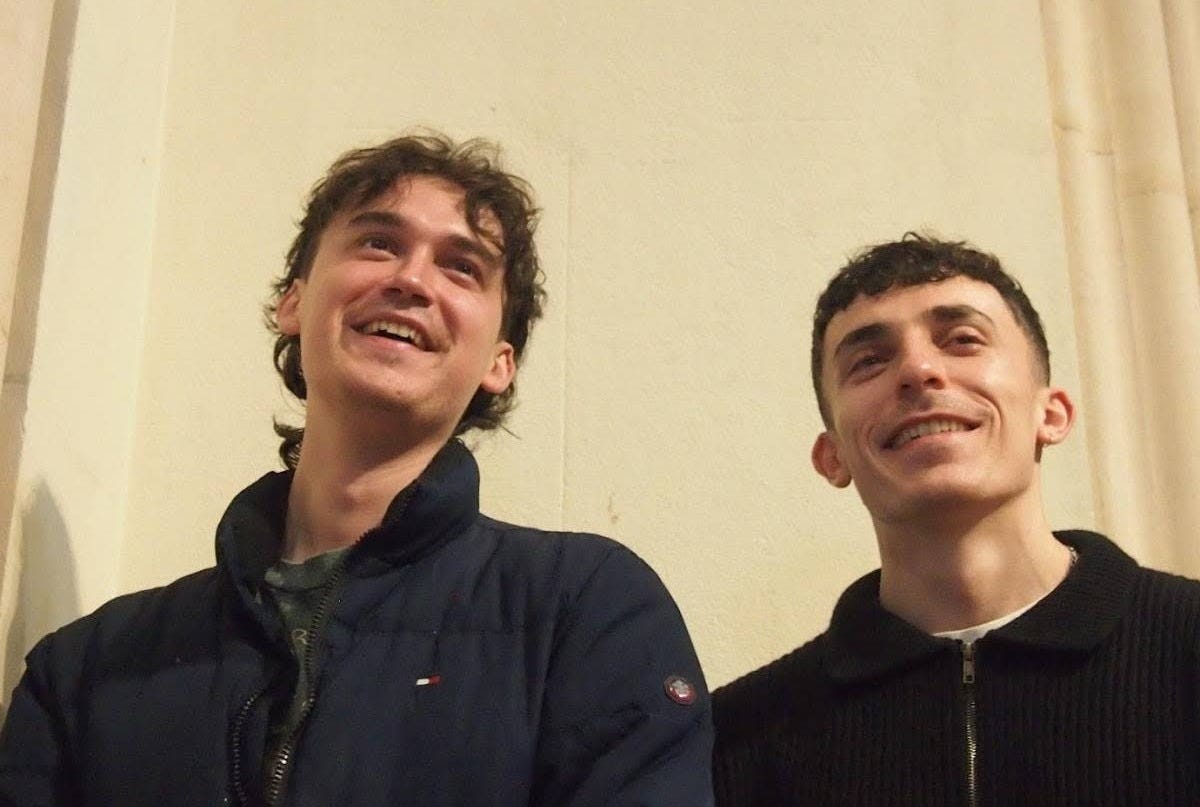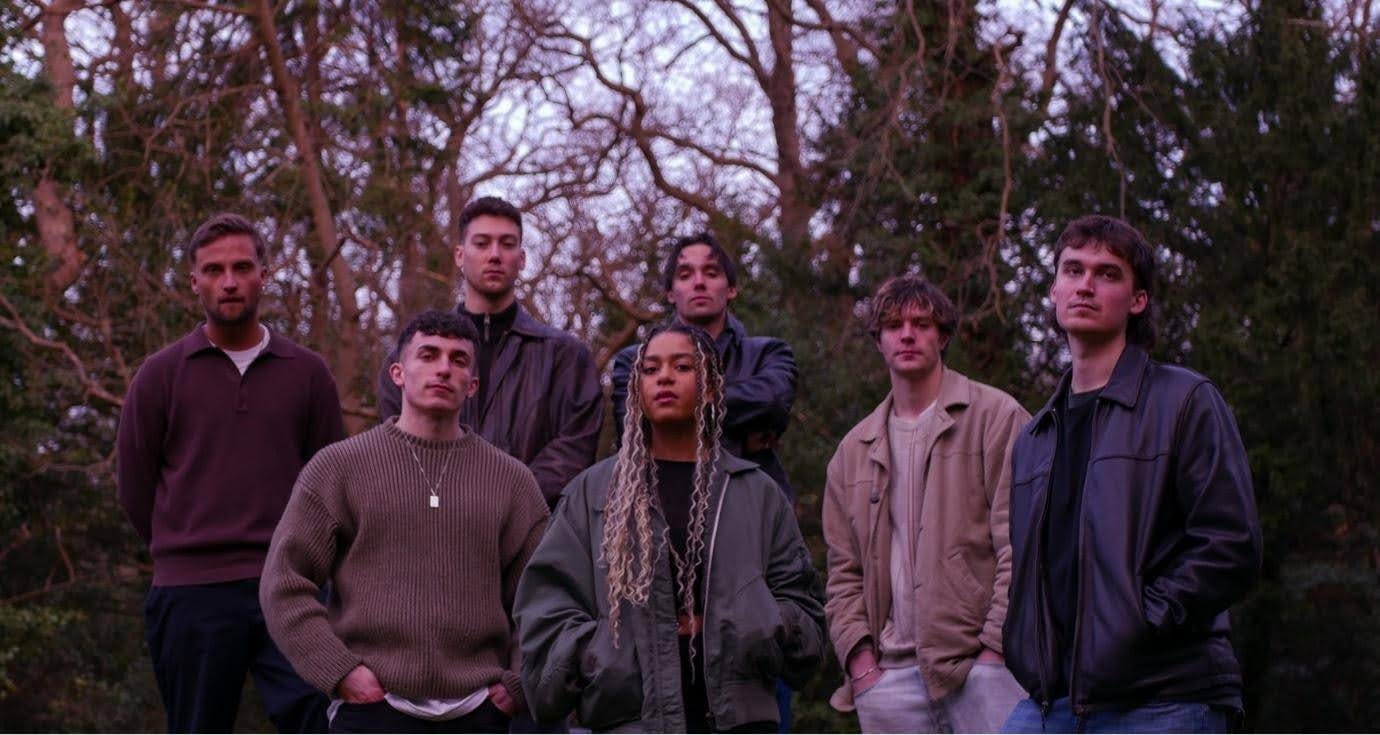Faith, Harmony, & Discovery: An Interview with The Grove
Tracing the band's trajectory from church roots to London's indie soul scene
Writer Sebastian Lloyd sat down with brothers Hudson and Sheffield Farley-Moore of the seven-piece indie soul collective The Grove to discuss how a mix of ingenuity and staying schtum has resulted in their bold rise through the London scene.
Sheffield Farley-Moore is trying to explain why they’d keep a megaphone behind the pulpit. “I’m just not sure why they’d need it.” Standing in St John’s Church in Greenwich, London, the guitarist of The Grove imitates a sermon through the horn. He and his brother, Hudson—my childhood friend and The Grove’s drummer—met me in the church where I first saw them perform as kids when we were at school together, back when their dad was vicar. “It hasn’t changed, but it feels bigger.”
The same certainly cannot be said of The Grove. In 2022, their current lineup was completed. Habiba Sesay’s singular vocal, combined with Hudson’s meticulous drumming and Peter Schunemann’s lead guitar, resulted in slick, artful singles that culminated in last year’s self-titled EP. Sesay’s delivery complexifies the melodies, while the instrumentals remain determinedly expansive, particularly when played live (as heard in the live session below). It’s nostalgic, rhythmic, and lovelorn pop with a sophisticated and ever-maturing sound.
“When we were away (in Wales) recording, we were together constantly and had a cohesive approach to writing,” said Hudson. “It definitely feels different.” The two brothers sat under the shadow of the organ at the back of the room. “Music’s never really felt like a hobby. If anything, it’s more and more important as you grow up and have a ‘normal’ life,” pondered Sheffield, holding a mug plastered with an obtusely sized Union Jack.
Although together for six-plus years, albeit with a changing lineup, The Grove is still a young band. The necessity of keeping a level-headed approach, particularly when balancing work and music in a city like London, is clearly understood. “If you’ve had, like, two weeks to think about something, it’s going to be bubbling around in your head,” said Sheffield. “Fewer people with fewer things to say is usually a better place to start.” Hudson is softly direct throughout the interview, a calm, unwavering presence ever since I can remember. His influence is unmistakable in The Grove.
There’s a danceable, lounge-pop feel to songs like “All I’ve Said” and their hit “Isn’t She,” while “Flame” and “Meadow Blues” are sentimental indie tracks with spacious instrumentals that reflect the influence of London’s jazz scene. They’re impressive live, with additions like Joe Fitz’s trumpet playing, Joel Slidel’s rap, and bassist Robbie Whyte’s textured vocals giving them a distinctive edge compared to their studio sound.
With an oversaturated online music scene, I’d argue it’s more vital than ever to be a badass live act. This has clicked in The Grove’s collective mind, and their rise has been gaining momentum, with regular radio play on stations like BBC Radio 1, 6 Music, and BBC Radio London. Last year, they reached the final of the Isle of Wight New Blood competition. I sat down with Sheffield and Hudson Farley-Moore to discuss first times, religion, siblinghood, and much more.
I wanted to ask about the first time you guys played together. Was is it in the church band?
Sheffield: We used to play trumpet and clarinet together. We’d play “Happy Birthday” for people—Mum and Dad, our grandparents… It was a bit of a no-leave, really. Free as well. My biggest regret is that we didn’t start charging for appearances back then.
Hudson: It was quite a timeless thing, wasn’t it? It would just get recycled every year. There’d be no escaping it—you’d get your trumpet and clarinet out again.
Would you say you’re both still practising Christians now?
Hudson: I’d say so. I still play in a band at a different church, but it’s a bit more highly produced. We play with a click in our ears, so it’s a bit more professional. It’s a different experience from what it was like growing up. We’ve played in different churches, and they all feel different.
Sheffield: I would say so, but as I’ve gotten older, I feel more valid in expressing and explaining it. I think I have a much more pluralistic view of religion and Christianity now. I don’t practise traditional Christianity that often or that well. I like playing in church occasionally—I'll play at Mum and Dad’s church every now and again. I like the space it provides. The space and stillness. But I realise you get a version of that in all religions. Growing up in a Christian household, I’ll always feel connected to those traditions in some way.
There was a statistic that 2,000 churches have closed in and around London since COVID, and many of them have been converted into concert spaces or venues due to their acoustics. If they’re privately owned gig spaces, then someone else might potentially be losing out on free access to culture and music. Do you feel like churches in London are places where young people feel safe expressing themselves, given the current climate?
Hudson: Obviously, it depends on the place and the church. A lot of churches need extra income, so renting them out as a commodity is always going to happen. But a lot of churches still provide free places for people to go if they wish.
Sheffield: Do you mean expressing yourself religiously?
Yes, but with more spaces being used commercially, there starts to be a debate around best practices and what role religious buildings play in how people access culture—for better or worse.
Sheffield: It’s a tricky one because it depends on what you think God is. For some, using churches for private gigs could be seen as quite blasphemous. But then, in the same breath, there’s that whole thing in the New Testament when Jesus smashed up the Jewish temples because people were selling things.
At the same time, some people believe anything creative is an expression of divine will. God created the universe, etc. Lots of artists say art, to them, is spiritual. Stillness, spirituality, and religion can really open up that stillness for creativity.
If you’re going to use a church building for something, perhaps something musical is the best thing because it’s an expression of God. It depends on how open-minded or traditional you are in your outlook.
That’s a lovely answer and leads me quite nicely to ask: How do you think music helps you reconnect with your spirituality?
Hudson: Being in a flow state—that’s quite a spiritual moment. But for me, I only really get to that point if I’ve been practising loads. Then I can reach a state where I’m expressing myself without having to think about anything.
Sheffield: Playing guitar is like therapy for me. It’s an escape from the world. The escapism or self-expression of writing a song—it does feel spiritual, or like magic. It transports you somewhere else, and the more you do it, the more you can switch it on, in a weird way.
Like a little portal?
Sheffield: Yeah, it’s that flow state. I think it applies to all arts—you have to flex this muscle where you’re not being influenced by your thoughts but actually acting on impulse.
I wanted to think about you two as brothers in a band. There are plenty of examples, but I wanted to know how, or if, it comes into the band in any way—like in the creative process. And could you give me an insight into your process as a band as a whole? For example, when you went away to Wales to write your EP?
Sheffield: To be honest, I think it’s just a good excuse to see your brother every week. We don’t have to, like, meet up and go for a run because we’ll see each other at practice.
Hudson: Yeah, in terms of writing, when we met up and went away, it was definitely more organic. There are seven of us in the band, so when you’re writing just once a week, you might turn up to rehearsal with a whole week of ideas. That’s a lot to condense together, so you often have to prioritise. When you’re seeing each other every day, there’s a much more cohesive way of approaching writing. Ideas can happen collaboratively.
Sheffield: To be fair, because Hud is very talented on the drums, we’ll have sessions just the two of us so he can help me figure out some rhythm things. But in terms of our sibling-ness, I don’t know if it really comes into it at all?
Don’t you think that because you’re both quite chilled out, you have that extra insight about each other? Maybe that contributes to an atmosphere where you can say, “OK, let’s just wait and figure out this process naturally.”
Sheffield: I think that’s 100% right. Especially because I’ve been in the band a bit longer. Having Hudson there—he’s a very solid presence. Like an observer in the room. There’s nothing fuelling any fire if there was a fire, if you know what I mean?
I think the word "organically" gets used way too much now, but do you think there’s a process everyone has to go through together creatively to avoid a big idea dump?
Sheffield: There are so many members, I’ve kind of stopped bringing in any organic ideas. If I’m not in the room when the music is being made, I don’t even bother thinking about changing anything. When you turn up, there’s always someone saying something about something. I don’t say anything. I don’t think anything. I just think it all sounds good.
A very diplomatic answer.
Sheffield: You’ve got to pick your moments. If someone turns up saying, “This song’s shit, we need to do this, we need to do that,” it’s just kinda like—oh man, I just finished work. Chill out. Let me have a cup of tea. Then we’ll tear this piece apart.
Although I’ve never been in a Grove rehearsal, I think it’s interesting that you’d say Hudson is the most chilled out because in the mixes, he’s usually quite prominent.
Hudson: When it comes to logistical stuff, I get a bit more annoyed. But when it comes to the actual music, I’m fairly chilled. If anything, I’m normally leaning towards, “Let’s just leave it, it’s fine.”
Would you say it’s an active choice by everyone in the band to push the drumming more, or do you push for that yourself?
Hudson: I’ll be the one pushing for my parts the most because it dictates what I have to play, but The Grove’s sound has changed quite a lot since I joined.
Let me ask one more question: If there was one thing about the music industry in London you’d change, what would it be?
Sheffield: Getting paid more to play gigs.
Hudson: I’d say more spaces to play when you’re growing up, and more places to learn. The money sounds good as well.
The Grove’s self-titled EP is available on streaming. Follow the band on Instagram for updates on gigs and new releases.
Credits
Interviewer:
Copy Editor:








